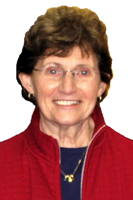
|
The Society of Folk Dance Historians (SFDH) Teme Kernerman
[
Home |
About |
Encyclopedia | CLICK AN IMAGE TO ENLARGE |

|
BACKGROUND
Information: Teme Kernerman, teacher of Israeli dance.
Teme London Kernerman is among North America's foremost Israeli dance authorities. She began teaching in the 1950s and started a performance a group called Nirkoda and a seniors' group called "Chai." Being from Toronto, Ontario, Teme greatly influenced the popularity of Israeli folk dance in Canada.
Prior to taking up residence in Tel-Aviv, Israel, in 1960, Teme was the director of the YM-YWHA Dance Centre in Toronto. She was instrumental in introducing Israeli folk dance in the parochial and Jewish schools in Toronto.
Teme has taught Israeli folk dance and teaching techniques at camps and worshops in Canada, Israel, and the United States, including Mainewoods Dance Camp, of which she was a director for three years. She also has done television and stage work in North America. She became well known in the Toronta area through many theater and TV appearances. She was the choreographer for the 1992 television production of Last Wish.
Teme founded and organized the Annual Israeli Folk Dance Festival, and the Annual Israeli Folkdance Workshop at the YM-YWHA, for many years bringing to the workshop many well-known Israeli teachers who were concurrently visiting North America. Teme also has been a co-coordinator of folk dancing at the Bathurst Jewish Community Centre (BJCC), and founder and director of the "Rikudiyah," the Annual Israeli Dance Festival for Children in Toronto. She founded the Nirkoda Performance Group of Toronto.
She was a demonstrator for the legendary Fred Berk, organized a great youth movement festival for years, and started the Ontario Folk Dancing Association. She has introduced thousands of children to Israeli folk dancing through participation in Rikudiyah.
Teme eventually returned from Israel to live in Toronto.
Dances Teme has taught include Abanibi, Ale Brider, Anachnu Olim Aleiyech Yerushalayim, Ani Chozer Habayta, Ani Purim, Az Der Rebbe Zingt, Bizchutam Kayam Haolam, Chai, Dayenu, Debka Kafrit, Eize Misibah, Elem V'Susato, Emet O Hova, Eretz Israel, Freilach Lidl, Hadegel Sheli, Hadoodaim, Hatikva LaShalom, Hevenu Shalom Aleichem, Hora Bailik, Hulyet Kinderlach, Kulam Kan Medabrim Al Hashalom, Kumi Ori, Lach Yerushalayim, Lashana Haba'ah, Leorech Hatayelet, Lirushalayim, Mi Yivneh Bayit, Nesader Ma'agal Gadol, Nitzaney Shalom, Ole Ole, Osheh Shalom, Pashtu Kvasim, Sapri Tama, Sevivon, Sha'arey Yerushalayim, Shalom Al Israel, Sharei Yerushalayim, Sher, Shir Oleh Me'emek, Shiri Li Kineret, Shivti (a game), Simchat Neurim, Tfila, Tfilat Hasachar, Tzahaki, Uvneh Yerushalayim, Vehave Aleinu (Bracha V'Shalom), Yesh Li Chaver, and Yom Yulad Bo Shir.
This page © 2018 by Ron Houston.
Please do not copy any part of this page without including this copyright notice.
Please do not copy small portions out of context.
Please do not copy large portions without permission from Ron Houston.